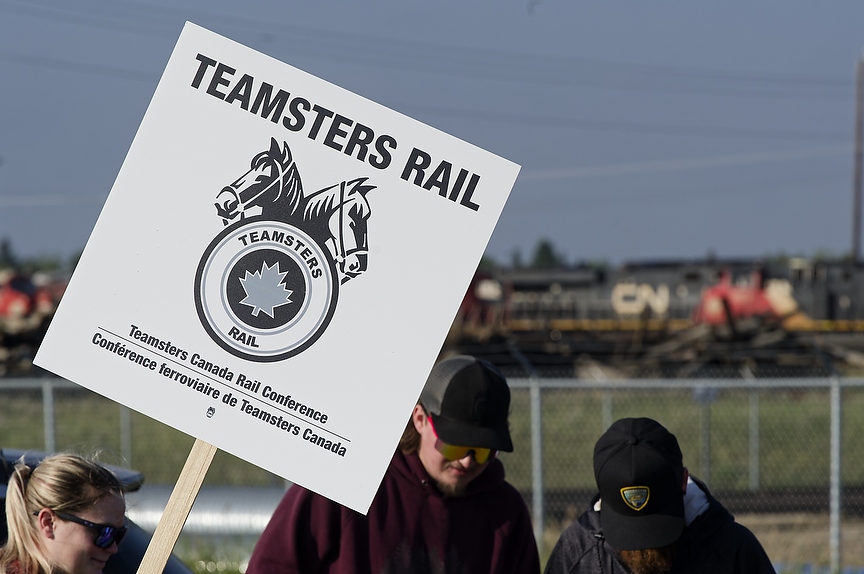
Workers of the Canadian National Railway in Grande Prairie were locked out along with about 10,000 railway employees across the country, halting the national rail service early last Thursday (Aug. 22) morning.
CN issued a lockout notice on Aug. 18 to Teamster Canada Rail Conference (TCRC), the union representing rail workers, if an agreement or binding arbitration was not made by Aug. 22 at 00:01 ET.
“I really fear that this dispute is just yet another blow to our frail and fragile recovery in our economy and so it's really unfortunate,” said City of Grande Prairie Mayor Jackie Clayton.
“We've heard multiple scenarios of what this could look like; one day of stoppage will take weeks of recovery.”
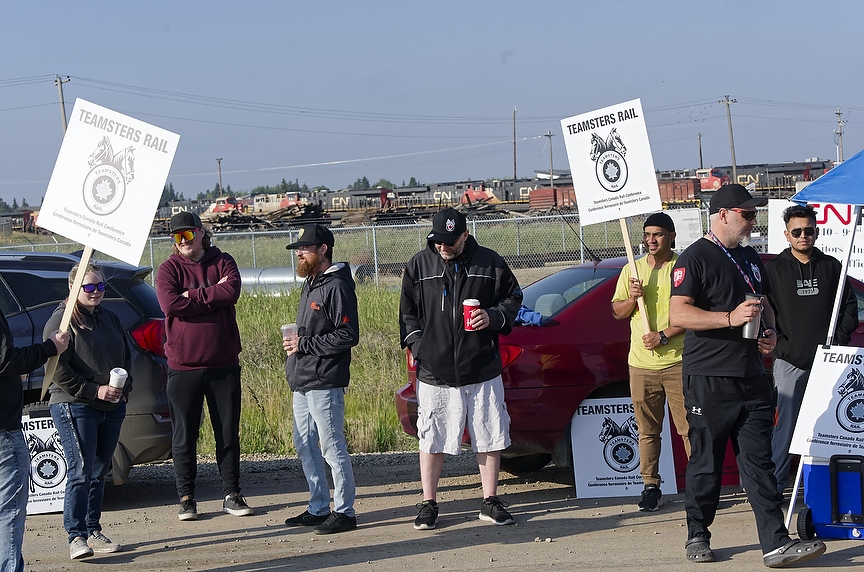
About 15 people with TCRC signs were outside of the CN rail yard in Grande Prairie on Thursday morning. A local TCRC representative was not available for comment.
“These guys aren't striking; they got locked out,” said Candice Mills, whose husband is represented by TCRC in Grande Prairie.
She said it is unfortunate that CN has locked out workers, noting some locals have safety concerns and want fair wages in line with inflation.
By the afternoon, Federal Minister of Labour Steven MacKinnon announced he was sending the dispute to binding arbitration through the Canada Industrial Relations Board (CIRB) and ordered the railways to resume work as quickly as possible.
“Millions of Canadians rely on our railways every day, workers, farmers, ranchers, commuters, small businesses, miners, chemists, scientists, the list goes on, and the impacts cannot be understated, and they extend to every corner of this country,” he said.
“It is the government's responsibility to ensure industrial peace in this critically vital sector.
“Thus, we will be examining why we experience repeated conflicts in the railway sector and the conditions that led to the parallel work stoppages we are seeing.
Municipalities and industry members were calling on the federal government to take action.
On Friday, a day after the minister's order, CN received a 72-hour strike notice from the TCRC, which would see the union’s members begin striking on Monday, Aug. 26.
“By sidestepping the collective bargaining process and ordering binding arbitration, the federal government has undermined the foundation on which labour unions work to improve wages and working conditions for all Canadians,” said Paul Boucher, TCRC president.
“Bargaining is also the primary way our union fights for rail safety — all considerations that outweigh short-term economic concerns.”
On Saturday, CIRB ordered that no further work stoppage could happen as a strike or lockout; TCRC said it would appeal the ruling in federal court.
Boucher says the CIRB decision sets a “dangerous precedent” and “that large companies need only stop their operations for a few hours, inflicting short-term economic pain, and the federal government will step in to break a union.
“The rights of Canadian workers have been significantly diminished today.”
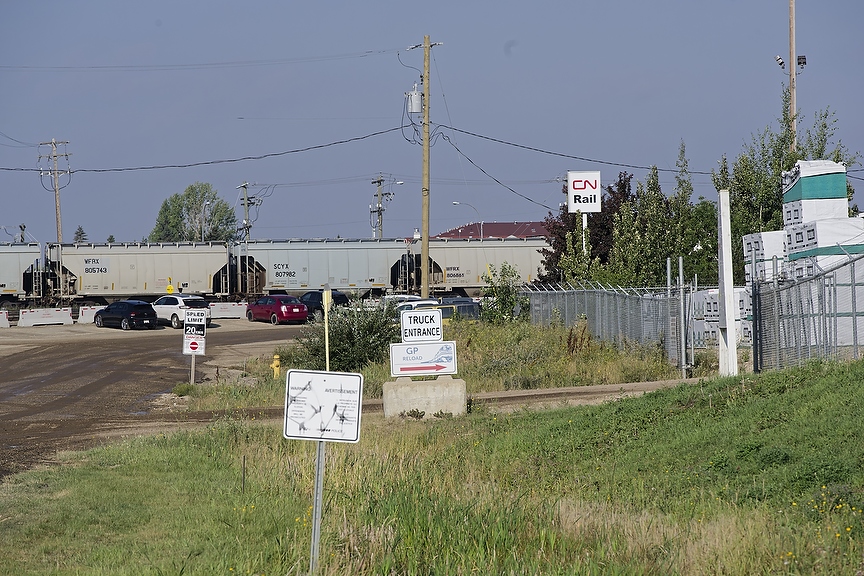
Local impact
The rail stoppage has local politicians, industry leaders and agricultural producers concerned.
“The impacts of the rail stoppage are incredibly expansive, every single railcar that's not delivered could mean a loss of a shift at a local mill or layoffs in the peak of agricultural season; this translates into fewer dollars spent in local businesses and a less prosperous community for everyone,” said Clayton.
Andre Harpe, a producer near Valhalla Centre and chair of the Grain Growers of Canada (GCG), said some grain elevators have begun not accepting deliveries in anticipation of rail stoppage.
With grain elevators on railways, producers are dependent on the rail system. Delays will only mean lost sales, degraded grain quality, and a loss of market confidence, said the GGC in a statement.
“This disruption is happening at the worst possible moment, during the start of the harvest season, when our farmers are most dependent on our rail network,” said Kyle Larkin, GGC executive director.
The County of Grande Prairie declared an agricultural disaster on Thursday due to poor crop yields from extreme drought conditions.
“The rail stoppage is not good for the county, or anybody,” said County of Grande Prairie Reeve Bob Marshall.
“It's not a good situation at all.
“The vast majority of our agricultural producers are swinging into harvest right now.”
Harpe noted holding on to grain only adds to the cost for producers who have to store product and ensure it does not spoil.
Trucking is not an option, according to Harpe, Marshall and Clayton, who all noted that large quantities cannot be moved efficiently. As well, worker shortages the trucking industy is currently facing isn’t helping.
Harpe said he has heard that if the railway was shut down for a week it could be a month before it could return to normal, creating a larger struggle not only for local producers but all Canadian farmers.
“A shutdown of Canada’s rail network has the potential to shut down many of our mills,” said Derek Nighbor, Forest Products Association of Canada (FPAC) president.
“It’s a massive drag on Canada’s competitiveness position and international reputation.
“The federal government has an obligation to act immediately and restore this critical service.”
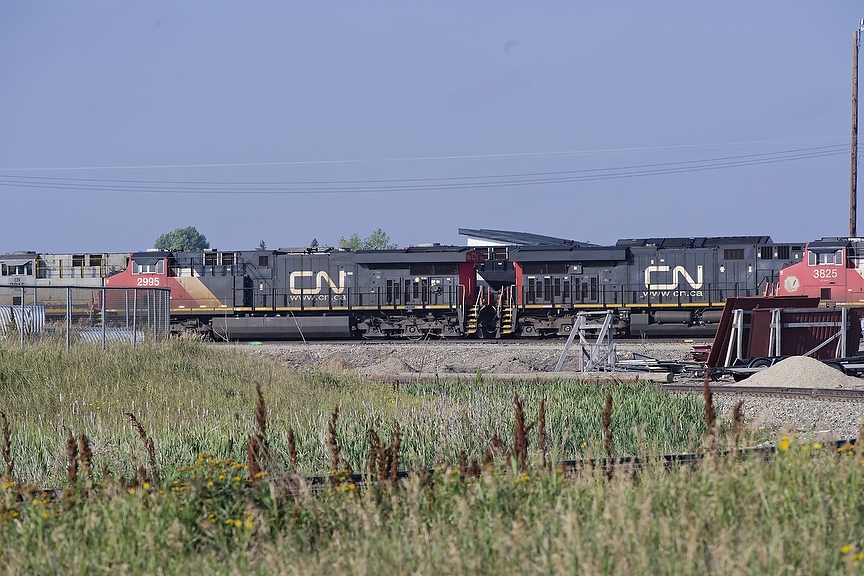
Advocating for rail
The city and county are part of the Community Rail Advocacy Alliance (CRAA) that advocates for reliable and equitable railcar service. The CRAA is made up of 22 municipalities and industry leaders.
“We must implement solutions that prevent this devastating situation from happening again,” said the CRAA in a statement.
“Our membership is calling for federal officials of all parties to take the necessary steps to amend the Canada Labour Code to include rail as an essential service.”
Clayton wants to see change.
“Coming out of this, the federal government has an opportunity to look at the Canada labour code to deem rail an essential service.”
Marshall said since the CRAA has begun advocating he’s heard from industry players and agricultural producers of its successes.
“We had to get in front of the province, and also the feds to put pressure on rail, CN and CPKC to meet their obligations, and then they got good for a while, and then that fizzled out.
“My impression is, unless we keep the pressure on, and if we don't keep the pressure on, it's going to fizzle out again, so it's something we're going to continue to do,” said Marshall.
“If we're going to increase our growth whether it's oil and gas or agriculture or forestry, anything like that, we need even better rail access and more capacity in our region.”
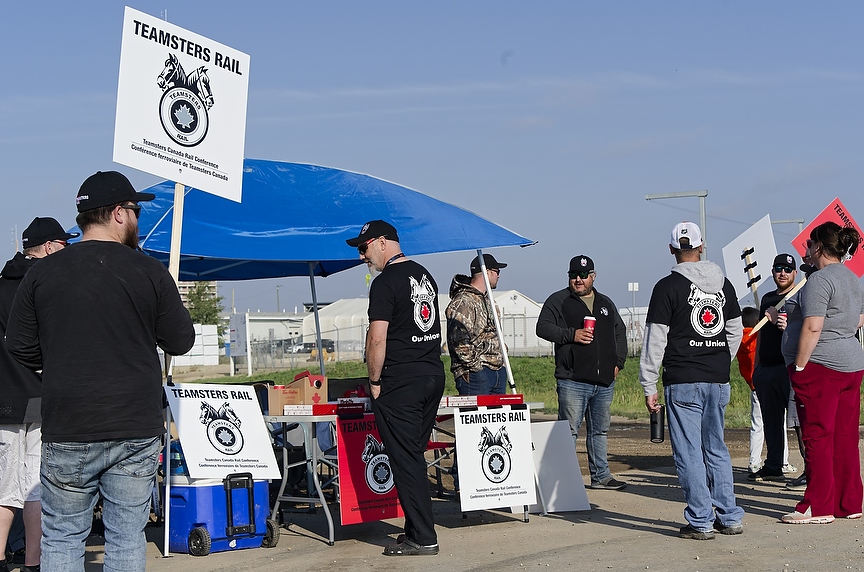
Leading to the work stoppage
Labour minister MacKinnon said on social media that he met with CN, CPKC, and teamsters in Montreal last Tuesday and Calgary last Wednesday before the work stoppages.
On Aug. 19, MacKinnon said in a statement, “These collective bargaining negotiations belong to CN Rail, CPKC, and TCRC workers alone.”
Under section 107 of the Canada Labour Code, the minister can order the CIRB to impose binding arbitration in disputes to avert strikes or lockouts.
The province released a statement on Thursday urging the federal government to intervene with binding arbitration.
“While we respect the collective bargaining process, the collateral damage to Canadians, our businesses and our country’s international reputation is too high to allow the simultaneous disruption of both of these railways to continue,” said the province in a statement.
Thursday’s lockout stopped the rail service nationwide as TCRC is also negotiating with CPKC, who locked out TCRC represented employees on the same deadline as CN.
“Throughout this process, CN and CPKC have shown themselves willing to compromise rail safety and tear families apart to earn an extra buck,” said Boucher, TCRC president.
“The railroads don’t care about farmers, small businesses, supply chains or their own employees.
“Their sole focus is boosting their bottom line, even if it means jeopardizing the entire economy.”
CN said in a statement that “the union did not respond to another offer by CN in a final attempt to avoid a labour disruption.”
The union said it has put forward multiple offers, all of which it believes were not seriously considered by either company.
CN says its conductors and locomotive engineers currently work about 160 days a year and in 2023 the average conductor made about $121,000, while a locomotive engineer earned about $150,000, both not including pension and benefits.
TCRC says the main obstacle to reaching an agreement is the companies’ demands, saying it believes the company demands will weaken protections around rest periods and scheduling, resulting in the risk of fatigue-related safety issues.
The union says CN “continues to demand a forced relocation scheme, which could see workers ordered to move across the country, tearing families apart in the process.”
CN said in a statement that it has negotiated in good faith for over nine months.
The collective agreement between TCRC and CN expired on December 31, 2023, and has been extended under Canadian law until the parties reach an agreement.
This story is up to date as of Aug. 26 and is developing.